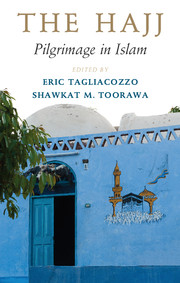Book contents
- Frontmatter
- Contents
- List of Maps, Charts, and Figures
- List of contributors
- Preface
- List of abbreviations
- Note on Dates and Transliteration
- Introduction
- PART ONE EVOLUTION
- 1 Pilgrimage in Pre-Islamic Arabia and Late Antiquity
- 2 Why Mecca? Abraham and the Hajj in the Islamic Tradition
- 3 The Early Hajj: Seventh–Eighth Centuries CE
- 4 Women and the Hajj
- PART TWO JOURNEY
- PART THREE INFRASTRUCTURE
- PART FOUR PERFORMANCE
- Glossary
- Works Cited
- Videography
- Index
- Plate Section
2 - Why Mecca? Abraham and the Hajj in the Islamic Tradition
from PART ONE - EVOLUTION
Published online by Cambridge University Press: 05 November 2015
- Frontmatter
- Contents
- List of Maps, Charts, and Figures
- List of contributors
- Preface
- List of abbreviations
- Note on Dates and Transliteration
- Introduction
- PART ONE EVOLUTION
- 1 Pilgrimage in Pre-Islamic Arabia and Late Antiquity
- 2 Why Mecca? Abraham and the Hajj in the Islamic Tradition
- 3 The Early Hajj: Seventh–Eighth Centuries CE
- 4 Women and the Hajj
- PART TWO JOURNEY
- PART THREE INFRASTRUCTURE
- PART FOUR PERFORMANCE
- Glossary
- Works Cited
- Videography
- Index
- Plate Section
Summary
Every day, Muslims remember the blessings bestowed by God on the biblical figure Abraham when they recite the following in their five daily prayers:
O Allah, bless Muhammad and the folk of Muhammad as You blessed Ibrahim and the folk of Ibrahim. And show grace to Muhammad and the folk of Muhammad as you did to Ibrahim and the folk of Ibrahim … for You are truly the Most Praiseworthy and Noble.
Numerous reasons are given to explain why Muslims are asked to recognize and pray for Abraham daily in this way. One of the reasons, discussed further in this chapter, is the belief that Abraham himself had prayed for Muhammad and his followers. Another more foundational reason is that the sharia of the prophet Muhammad and that of the prophet Abraham are said to have had a special link and resemblance.
According to Islamic theology, God created human beings so that they would know and worship Him. He created the universe as an arena full of signs (āyāt) that point to His existence, and gave the human being the unique capacity to choose to submit to Him and worship Him. However, while these signs provide general direction toward the existence of a higher power, an interpreter – or prophet – is needed to help truly interpret and explicate the meaning of these signs. Ever since the creation of the human being and his placement on earth, prophets and messengers (that subset of prophets sent with a unique “message,” i.e., a unique set of laws [sharīʿa]) were sent to each people, in order to call them to God, to warn them against corrupt and immoral behavior, and to remind them of the coming Judgment.
All of the prophets are believed to have been sent with the mission of teaching the same theological principles – the main one being the absolute oneness of God (tawḥīd). But not all shared the same detailed legal and ritual rulings required of them by God. According to Muslim belief, one reason for the special connection between Abraham and Muhammad was that they not only shared theological principles (uṣūl), but also detailed legal matters (furūʿ), such as circumcision, ritual animal sacrifice, the direction of prayer (toward Mecca and the Kaʿba), and the performance of the pilgrimage to Mecca (ḥajj).
- Type
- Chapter
- Information
- The HajjPilgrimage in Islam, pp. 31 - 41Publisher: Cambridge University PressPrint publication year: 2015
- 1
- Cited by

